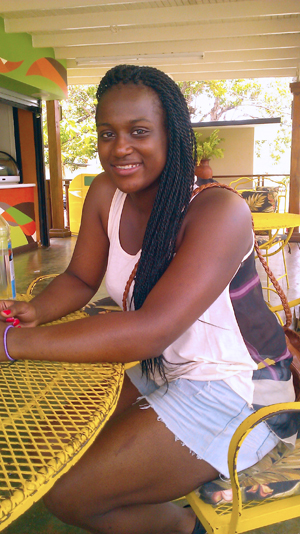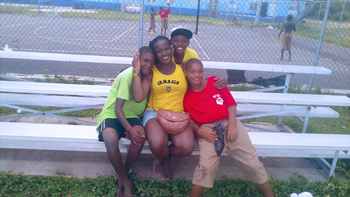1. What’s it like to live and study abroad? To be amongst the first group of students to attend the Jamaica service learning program of 2013 at SUNY New Paltz , literally made me feel good. I got the experience to study and do voluntary work in a different country. Studying at the University of the West Indies in conjunction with completing 15-20 hours a week of voluntary work at an all-boys orphanage/school called the Alpha Boys School, I got to interact and tutor math and English to children who were amazingly talented. The children in Jamaica were free spirited and love to play football, run track and field and stay active. I can’t say there was ever a dull moment. Other than their hobbies, they were smart. I noticed as I studied there, our cultural differences would get in the way and I found it interesting. At times when tutoring the children I would say words that meant something totally different and they would pause and look at me puzzled. On most days they would teach me words in Patoise. We had some “dialect lessons” and the girls and I would go back to the dorms speaking Patoise that we learned every day from the boys. Studying in Jamaica is intense just like any other college or university in America. On campus, fellow students would tell us about their intricate courses and upcoming tests that they had to study for. Living in Jamaica is totally different, aside from the climate, the living status might take some getting use to. For example, public transportation is a bit different. Unlike New York, Jamaica doesn’t use Metro-cards. Fruits are almost on every tree! Mangos surround the campus. Coconuts and Akcee flourish the island. Mosquitoes are everywhere, but that’s what makes the trip bitter-sweet. It isn’t hard adjusting to the lifestyle as a student but it does take some time getting use to.
To be amongst the first group of students to attend the Jamaica service learning program of 2013 at SUNY New Paltz , literally made me feel good. I got the experience to study and do voluntary work in a different country. Studying at the University of the West Indies in conjunction with completing 15-20 hours a week of voluntary work at an all-boys orphanage/school called the Alpha Boys School, I got to interact and tutor math and English to children who were amazingly talented. The children in Jamaica were free spirited and love to play football, run track and field and stay active. I can’t say there was ever a dull moment. Other than their hobbies, they were smart. I noticed as I studied there, our cultural differences would get in the way and I found it interesting. At times when tutoring the children I would say words that meant something totally different and they would pause and look at me puzzled. On most days they would teach me words in Patoise. We had some “dialect lessons” and the girls and I would go back to the dorms speaking Patoise that we learned every day from the boys. Studying in Jamaica is intense just like any other college or university in America. On campus, fellow students would tell us about their intricate courses and upcoming tests that they had to study for. Living in Jamaica is totally different, aside from the climate, the living status might take some getting use to. For example, public transportation is a bit different. Unlike New York, Jamaica doesn’t use Metro-cards. Fruits are almost on every tree! Mangos surround the campus. Coconuts and Akcee flourish the island. Mosquitoes are everywhere, but that’s what makes the trip bitter-sweet. It isn’t hard adjusting to the lifestyle as a student but it does take some time getting use to.
2. What are the classes like?
Attending the classes in Jamaica was pretty much like New Paltz. There’s a professor in the front of the room. Air Conditioning is active. Classrooms do have projectors and desks, large windows and very comfortable space, nothing out of the ordinary. Our classes were more like lectures. It was about 2 ½ to 3 hours long because we learned about a wide range of Jamaica culture which had a lot of content, especially with their music, the classes needed to cover as much as possible.
3. What is it like getting to know new people from a different culture? I thought of it as a fun exploring thing to do. I met so many individuals in Jamaica. Most of them were young adults around my age on the campus. We talked, studied together and even went out at times. They liked my American culture as I admired theirs. Getting to know people became a hobby. It was something that you felt the need to do. You become more interested about the citizens and all you want to do is interact and learn more about them. Knowing that your time is limited, you try to make as many friends as possible. People were always nice and welcoming and because of that I have made lifelong friends with some of the students.
I thought of it as a fun exploring thing to do. I met so many individuals in Jamaica. Most of them were young adults around my age on the campus. We talked, studied together and even went out at times. They liked my American culture as I admired theirs. Getting to know people became a hobby. It was something that you felt the need to do. You become more interested about the citizens and all you want to do is interact and learn more about them. Knowing that your time is limited, you try to make as many friends as possible. People were always nice and welcoming and because of that I have made lifelong friends with some of the students.
4. What about family and friends back home?
Family and friends back home always kept in contact. They couldn’t wait to call and hear all about my day. Using facebook also helped me keep in contact with my friends and it was cheaper to speak to them that way. My friends and family couldn’t wait to see the pictures and videos that I took abroad when I returned. Studying abroad had to be by far the best decision I had made my first year of college. It makes you feel more experienced academically and is something that all college students should experience at least once before graduating. Memories are made that you can take with you everywhere you go. The experience is personal and is something that no one can take from you!







